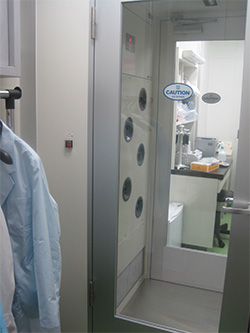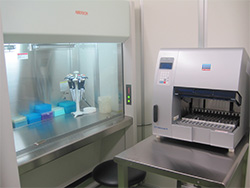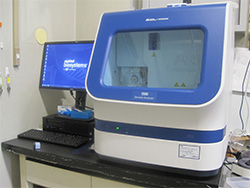Forensic Genetics
The Department of Forensic Genetics carries out the DNA testing of unidentified bodies during autopsies, DNA profiling to test for parentage and other matters in civil legal procedures, as well as engages in wide-ranging research on DNA.
DNA (deoxyribonucleic acid) is the biological polymer responsible for the transmission and expression of genetic information in most of the Earth's living organisms. Forensic genetics makes use of DNA polymorphisms, which exhibit individual differences in DNA sequences. We have previously used DNA polymorphisms from parasitic viruses and bacteria in humans to identify the place of origin of unidentified corpses. A DNA chip has already been developed for DNA polymorphisms found in the JC virus that dwells parasitically in the kidneys and is in use for actual testing; and, we are currently developing methods that utilize the Herpes virus and Helicobacter pylori bacterium, with the ultimate aim of using the DNA polymorphisms of these parasitic organisms to determine the place of origin of unidentified bodies.
In December 2013, we installed a Class 1000-level clean room. We were already extremely careful when testing old, minute samples, but the installation of the clean room enables contamination to be minimized, meaning we are now capable not only of highly accurate DNA profiling, but also of testing mitochondrial DNA (this can be tested from extremely minute samples, but contamination is a concern). We are also engaged in DNA profiling from formalin-fixed specimens, such as paraffin-embedded samples and histopathological specimens.
A future objective that is currently under consideration is the purchase of a next-generation sequencer. This device could be used to analyze genes for particular disorders and drug metabolism genes, further extending the field of forensic genetics and providing feedback for clinical forensics. In the Department of Forensic Genetics, our aim is to develop our field beyond the use of DNA profiling for human identification, to encompass roles in investigating the cause of death and in clinical forensic medicine.




